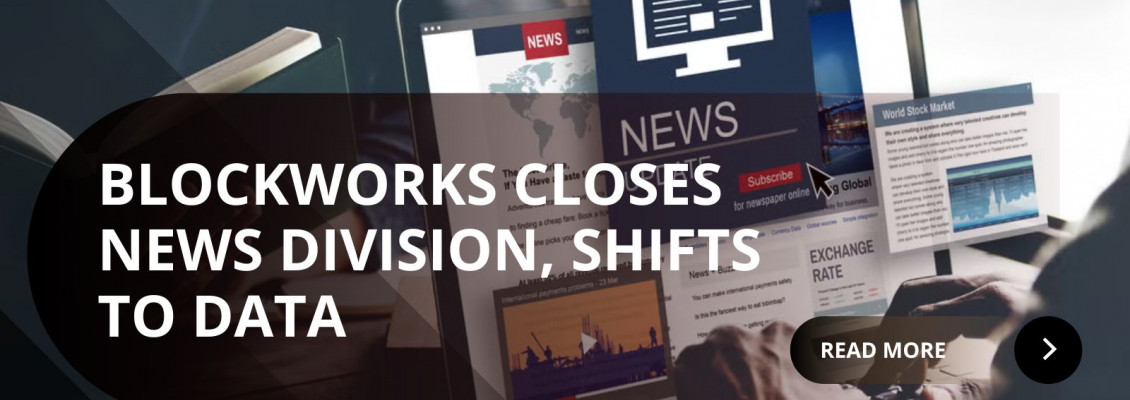
Opinion: Is Blockworks Right About Data or Are We Losing the Story in the Numbers?
When Blockworks announced it was winding down its news division to focus on data and analytics, it felt like another sign of the times. For many in the crypto media world, the move made sense. Analytics platforms are profitable, scalable, and easier to fund than newsrooms. But for others, it raised a deeper question: is this really what readers want?
I understand the tension. The business of news is hard. Advertising margins are thin, algorithms rule distribution, and audience attention shifts faster than a trending token. So when Blockworks’ co-founder Jason Yanowitz said that “data made up none of the company’s revenue a few years ago, and now represents about a third,” it’s clear the pivot has strong business logic behind it.
Still, business logic and reader loyalty are not always the same thing. And that’s where the story of Blockworks becomes about more than one company. It’s about what we value in media, and whether information without storytelling can truly connect to people.
The Smart Move Behind the Pivot
Let’s start with what Blockworks is doing right. The company’s Analytics 2.0 platform, launched earlier this year, is ambitious. It turns blockchain data into accessible dashboards, giving users insight into market movements, protocol performance, and on-chain metrics. For professionals who live and breathe crypto, this is gold.
It’s also smart business. Data subscriptions, research services, and institutional analytics are reliable revenue streams compared to the unpredictable economics of a newsroom. In an age when attention is fragmented and news cycles move at the speed of social media, building something predictable is a survival strategy.
But here’s where I pause. Because the future of media shouldn’t be about choosing between profitability and purpose. It should be about finding a way to blend the two.
What Made Blockworks Work
Blockworks didn’t build its reputation on dashboards or data feeds. It built it on trust.
Its news team earned credibility by translating complex crypto topics into clear stories. They didn’t just tell readers what happened; they explained why it mattered. That is the essence of journalism, and it’s what separates a data company from a media brand that resonates.
The truth is, data doesn’t replace journalism. It empowers it. When used well, analytics can add depth and accountability to reporting. Data gives journalists the evidence to back up their claims, to uncover patterns others miss, and to tell stories grounded in something verifiable.
But data without people becomes sterile. It informs, but it doesn’t inspire. It can tell you what’s happening in a market, but not how it affects someone’s livelihood, or what it means for a community, or why it matters to the future of an industry.
That connection, the one between the reader and the story, is what makes journalism irreplaceable.
A Bigger Question: What Do We Really Want From the News?
This moment is not just about Blockworks. It’s about all of us. What kind of media ecosystem are we building?
Readers often say they want quality journalism, but in practice, sensationalism drives clicks. Outrage spreads faster than nuance. The loudest voices, not the most accurate ones, dominate feeds and timelines.
So when a company like Blockworks pivots to data, it’s also responding to what the audience rewards. If engagement metrics favor emotion over analysis, who can blame media companies for shifting toward something more stable?
Still, we have to ask: Is this what we want the future of media to look like? Do we really want a landscape dominated by charts and algorithms, or do we still value stories that challenge us, connect us, and make us think?
Because if the industry only follows the numbers, it risks forgetting the people behind them.
Where the Opportunity Lies
The irony is that Blockworks has the perfect ingredients to do something revolutionary. Its data division could be a force that makes its journalism stronger, not redundant.
Imagine a newsroom powered by the same analytics that institutions pay for. Reporters with access to live blockchain metrics, uncovering trends before they surface, telling data-rich stories that still read like human ones. That’s the model the industry needs.
News doesn’t have to compete with data. It can evolve alongside it. The real opportunity is to combine truth and technology, evidence and empathy, insight and storytelling.
That’s how you create journalism that’s not just read, but trusted, and remembered.
The Verdict: Data Needs a Heartbeat
Blockworks’ pivot is understandable, even admirable in parts. It’s a reminder that media must evolve to survive. But if it comes at the cost of storytelling, it risks losing the connection that made it valuable in the first place.
Data can tell us what is happening. News tells us why it matters. We need both.
If Blockworks and others in the space can find that balance, if they can use their analytics not to replace journalism but to strengthen it, then maybe this isn’t the end of news after all.
Maybe it’s just the beginning of a smarter, more connected version of it.
Stay Connected
You can stay up to date on all News, Events, and Marketing of Rare Network, including Rare Evo: America’s Premier Blockchain Conference, happening July 28th-31st, 2026 at The ARIA Resort & Casino, by following our socials on X, LinkedIn, and YouTube.

Leave a Comment